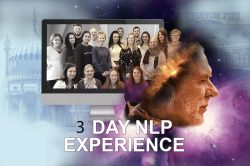The first subjects we cover on our NLP Practitioner training are the Presuppositions of NLP. If you have not yet been to any of our courses, you might be wondering as to why you would want to have a look at these.
Now, if I were to tell you that by just considering these convenient assumptions in terms of your existence today, you might find that in the light of one or more of these, you may alter your perception of your whole life – what would you think about that?

The presuppositions of NLP are neither rules nor regulations, and we do not even claim them to be true! They are simply very useful and powerful beliefs to have. Remember, NLP does not concern itself with whether something is true or not, but rather focuses on attaining a desired outcome (our own stories about our lives are sometimes made up from fragmented memories).
Sometimes referred to as the ‘beliefs of great communicators’, these beliefs will expand your thinking and help you maintain a resourceful state. Working with these pre-suppositions as your foundation will set you up for great success working with clients.
Here are the pre-suppositions of NLP with a brief explanation. The importance of these pre-suppositions is also supported by the Association for NLP, this is outlined on their website here.
The Presuppositions of NLP:
- Respect for the other person’s model of the world.
In order to communicate properly it is important that you have an understanding for the other person’s model of the world. All people have different ways of experiencing the world (different beliefs, values, filters, etc.). By understanding and respecting these differences instead of judging, better communication will occur. - Behaviour and change are to be evaluated in terms of context, and ecology. Change is only ‘true’ and sustainable if all the environmental conditions support it!
- Resistance in a client is a sign of a lack of rapport. (There are no resistant clients, only inflexible communicators. Effective communicators accept and utilize all communication presented to them.)In NLP, being in rapport with the client is crucial! If you are not in rapport, you will not get the positive outcome that you are working towards. In order to get a different outcome you must alter your communication (If what you’re doing isn’t working, do something different).
- People are not their behaviours. (Accept the person, change the behaviour.)
The behaviour a person is acting out is not the person itself, but the person’s response to something in their world. What NLP seeks to do, is to enable the person to have more choice in terms of their behaviour and their responses. - Everyone is doing the best they can with the resources they have available.
Behaviour is geared for adaptation, and present behavior is the best choice available. Every behaviour is motivated by a positive intent. - Calibrate on Behaviour: The most important information about a person is that person’s behaviour.
People’s behaviour is the only thing we as communicators can observe. Anything else is mind reading. We cannot enter the other person’s mind, and it is therefore important to calibrate on behaviour. - The map is not the territory. (The words we use are NOT the event or the item they represent.)
People respond to their experiences, not to reality itself. We do not have access to reality as it is, we do not know reality. We experience reality through our senses, our beliefs, our filter systems, our own personal “map” of reality. NLP works with changing the “maps” that are not working for the client. - You are in charge of your mind, and therefore your results (and I am also in charge of my mind and therefore my results).
Every action you take has first been a thought in your mind. For there to be an action, there must first be a thought. Nobody but yourself is in charge of your own thoughts, therefore nobody but yourself is in charge of your own results. You are the only person who can change your own results. - People have all the resources they need to succeed and to achieve their desired outcomes. (There are no unresourceful people, only unresourceful states.) All people have the ability to create whatever they want in their lives. If another person can do it, so can you. By the process of modeling you can do it even faster than the person who originally did it, because you don’t have to create a strategy as it has already been made for you. It’s all about getting into the right state, the state of excellence.
- All procedures should increase wholeness. Parts integration is better than labelling to create separateness. Labels can be good for seeing things more clearly under a microscope, but ultimately a telescope cannot see the whole land.
- There is ONLY feedback! (There is no failure, only feedback.)There is no need to label our results as failures. Rather, seeing our results as feedback and information that can enable us to seek improvement is far more powerful.
- The meaning of communication is the response you get.
The intention you have for the communication is just as important as the response that you get. The response that you get may be different to the response that you wanted. The response is feedback that you can use in order to alter your communication to get the appropriate response. - The Law of Requisite Variety: (The system/person with the most flexibility of behavior will control the system.)
The more flexible you are, the more opportunities you can take on in your life. If you have boundaries, you restrict yourself. Being open and flexible simply creates more choices in life. - All procedures should be designed to increase choice.
The more choices you have, the freer you are and the more influence you have.
Here is a longer version and explanation of the Presuppositions of NLP
Respect for the other person’s model of the world.
In order to get into rapport and influence any other human being, we have to have a respect for their viewpoint. In having the curiosity to understand their viewpoint, we can then connect and develop the rapport to guide them to a resourceful state.
Everyone has variances to the way they view the world based on their memories, beliefs, values and other internal filters. When you adopt this pre-supposition you can increase your effectiveness. Change does not occur by standing at polar opposites, however when you walk over in the other person’s shoes to see it from different angles, you can expand your own thinking and get a broader awareness of how to help your client.
When we judge others, we block the connection regardless of if we know it consciously or not. That’s why the ‘Now State’ is so powerful, it enables you to be fully expanded, not inside your own opinions of filters. To successfully work with a client, you are not offering advice based on your own points of view, this is not our job. Our job is to follow a process and structure to facilitate a journey that suits the client’s beliefs and values yet leads them to a resourceful state and empowerment.
Behaviour and change are to be evaluated in terms of context, and ecology
It is important that the changes the client desires all fit together harmoniously, otherwise the changes will not be sustainable back in their day to day life.
For example, if a client desires an increase in income, yet they want to give up their job, these desires don’t fit. It’s important to take responsibility as a Practitioner and check that the changes the client is asking for fits with what they want in their life.
Resistance in a client is a sign of a lack of rapport
Blame is a destructive force. In the world of communication, it is often pointed at others, for example ‘they are resistant to this’, ‘they didn’t grasp the concept’, ‘they didn’t understand’.
When really, we are accountable for the message we communicate and we cannot expect anyone to be influenced by us if we don’t develop rapport and connection. If someone is in disagreement with you, it means that you can work on your rapport. Rapport is a medium trance state, when you are truly in rapport, the words don’t really matter, and you will go out of your way to listen to someone when you have rapport with them. Our job as Practitioners is to maintain rapport with our clients at all times, which will enable us to be effective change agents.
People are not their behaviours.
There are many examples in life where we judge behaviours and label people based on what we see, when really, a person is not their behaviour, and they can change their behaviour.
Examples include: Someone arrives late to work every day could be perceived as ‘they don’t care’. When in fact the person may care deeply, however they have counterproductive habits operating inside their system which they have not yet discovered how to change. Someone might take a long time to achieve a particular task at work and the boss says ‘They are too slow’. In both of these examples, there is a label, a judgement on the identity. As Practitioners we do not judge or label anyone.
We would say ‘in that specific situation, the speed was slower than expected.’ To be an excellent Practitioner, it is essential to watch out for your own assumptions and generalisations. Behind every behaviours is a positive intent, therefore we cannot judge the person, we accept the person and change the behaviour.
Everyone is doing the best they can with the resources they have available.
We cannot always see all the choices available to us, everyone is doing the best they can with the awareness and choices available at the time and underneath every behaviour is a positive intent. When we understand the intention of the behaviour then we can lead the client to other ways that they can meet the intention and achieve the desired change.
Calibrate on Behaviour
This pre-supposition is important because we cannot enter someone else’s mind. The most important information we have about a person is their behaviour. An essential skill of an NLP Practitioner is Sensory Awareness, which enables us to calibrate on what we see and hear.
If someone folds their arms, some might say they are bored, some might say they are cold. As curious Practitioners, we simply observe and take in what we see, looking for patterns, shifts, any physiological sign that something has just happened in the mind of the client. The only way to help a client achieve meaningful change is to practise and use the skill of Sensory Awareness.
The map is not the territory.
The words we use are NOT the event or the item they represent.
People respond to experiences not reality. We interpret our experiences as reality when in fact it is just a map. There is no reality. We all experience life differently through our senses based on our memories and internal filters, therefore we are not changing the reality for the client, we are working with the maps that no longer serve the client.
You are in charge of your mind, and therefore your results
(And I am also in charge of my mind and therefore my results.)
Accountability is another fundamental pillar of NLP and change. This pre-supposition of NLP places us at ‘cause’ rather than ‘effect’. This puts the power back to us as creators of our own results. If we don’t get a certain result we want in life, it means there is something for us to learn. There is something we can do differently which will get a different outcome.
People have all the resources they need to succeed and to achieve their desired outcomes.
(There are no unresourceful people, only unresourceful states.)
The depth and infinite abilities of our minds make us very powerful. The only limits we have are the limits we place on ourselves. That being so, an NLP Practitioner is most successful when they approach life and all sessions with this pre-supposition as the foundation. It is not us as Practitioners that have the resources, we are purely facilitating. The Client has all the resources they need.
All procedures should increase wholeness.
Conflict prevents the system working at optimum effectiveness, therefore any work we do with clients should increase wholeness. Each part in conflict is striving for the same purpose and with the same underlying intention, through language we can re-connect the parts and remind the client that all parts ultimately want the same outcome and have a positive intent. This increases wholeness.
There is ONLY feedback!
(There is no failure, only feedback.)
The word failure often implies and elicits a negative state, yet all the greatest people in the world have hit stumbling blocks before reaching their desired destination. A highly successful Practitioner maintains a positive and resourceful state and is unshakeable in the face of challenge or an unsuccessful process.
That is simply feedback, information that guide you to a different course of action which will then attract a different result. For further reading on the presuppositions of success or failure you can read our article here.
The meaning of communication is the response you get.
When we are seeking to communicate it’s like we are passing on a baton, we need to ensure the other individual has a firm grasp. If the individual you are communicating with does not understand or receive your true intention – then this does not determine the quality of their listening, it’s feedback that you can adjust how you communicate to ensure the message is understand.
This goes hand in hand with accountable, we are 100% responsible and powerful creators of our results, therefore if the message is understood, there is something for us to learn as communicators.
The Law of Requisite Variety:
(The system/person with the most flexibility of behaviour will control the system.)
The more flexible we are in our thinking, the more successful we can be as communicators and Practitioners. Everyone thinks and responds differently based on their own filters and experiences, therefore if you communicate in one way, you limit yourself. Whereas, when you master the art of adapting and flexing your style to suit the needs of others, you can influence effectively in all situations.
All procedures should be designed to increase choice.
Choice is empowering. Choice is freedom. Therefore we can cultivate more good feeling when we increase choice. In NLP we are not magicians causing the change in others, we are facilitating a journey which will lead to enhanced choice and empowerment for the client.
In NLP we use language patterns that steer the client back in a position to recover choice so that they are impacting their results inside out rather than outside in.
The Presuppositions of NLP, written by Terry Elston & Natalie Rea




